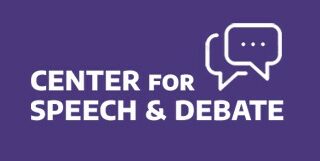RESOURCES
Here you can find several resources for teaching and studying speech and debate. Please feel free to use these materials with attribution.
CSD Debate: Who was the greatest heavyweight of all time: Joe Louis or Muhammad Ali?
The “Rhetoric and/as Boxing” course moderated a heavyweight debate. Two high profile boxing writers debated the resolution: “Who was the greatest heavyweight of all time? Joe Louis or Muhammed Ali?” Arguing for Louis was Bernard Fernandez, a 2020 inductee into the International Boxing Hall of Fame. Arguing for Ali was longtime Ring Magazine Managing Editor, Tom Gray. We followed a ... >>
How to watch a televised debate
CSD director, Dr. Matt McGarrity, worked with TVW on a video for Washington State schools on "How to watch a televised debate." Dr. McGarrity teaches the debate technique known as "flowing" and emphasizes to voters the importance of taking notes when watching televised debates. https://youtu.be/BOB8pd9NBmI
Rhetoric and/as Boxing: Physical arguments
Boxing, speech, and debate may seem like vastly different activities, but they share much in common. They involve performance, competition, strategy, and the ability to think on your feet. Like competitive specch and debate, boxers perform their arguments for the judges. This leads us to a discussion of how a fighter “argues for a round” or, potentially, “steals” the round ... >>
The Balance Between Detail and Clarity in Technical Speech
William Heins The canons of rhetoric—invention, arrangement, style, memory, and delivery—are the elements of speech through which a speaker conveys their message to an audience. These canons, however, produce three other elements of speech: detail, clarity, and elegance. The balance among them is fundamental to public speaking as all are necessary for a speaker to achieve their purpose: conveying a ... >>
Tips for Coaching High Apprehensive Speakers
Olivia Knoll Nervous public speakers. Whether you can hear it in the trembles of their voice or see it in the anxious crinkling of their notecard, we’ve all worked with them. By our terms as practitioners, these people are known as ‘high apprehensive speakers.’ Up to 75% of the population struggles with some degree of public speaking apprehension (Black). How ... >>







